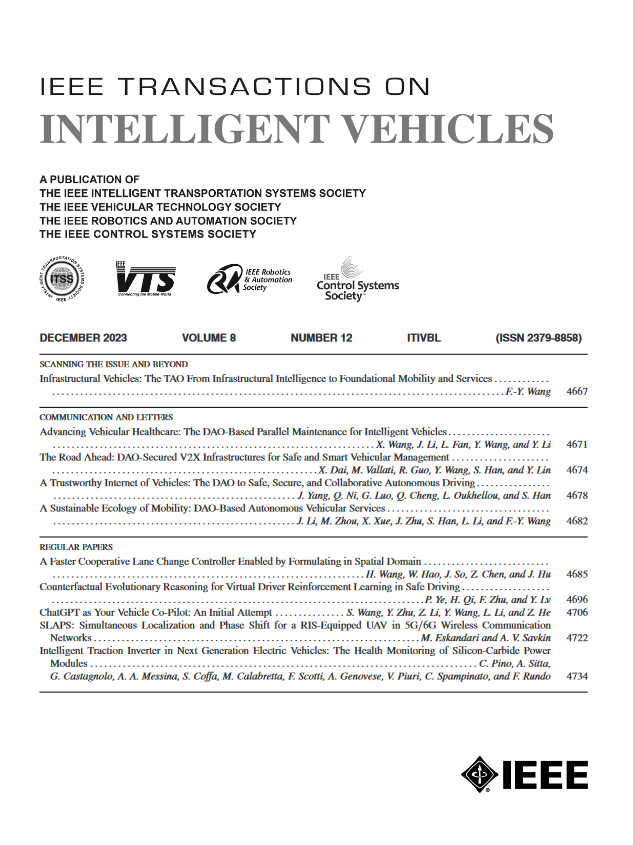Data-Driven Traffic Simulation: A Comprehensive Review
IF 14
1区 工程技术
Q1 COMPUTER SCIENCE, ARTIFICIAL INTELLIGENCE
引用次数: 0
Abstract
Autonomous vehicles (AVs) have the potential to significantly revolutionize society by providing a secure and efficient mode of transportation. Recent years have witnessed notable advancements in autonomous driving perception and prediction, but the challenge of validating the performance of AVs remains largely unresolved. Data-driven microscopic traffic simulation has become an important tool for autonomous driving testing due to 1) availability of high-fidelity traffic data; 2) its advantages of enabling large-scale testing and scenario reproducibility; and 3) its potential in reactive and realistic traffic simulation. However, a comprehensive review of this topic is currently lacking. This paper aims to fill this gap by summarizing relevant studies. The primary objective of this paper is to review current research efforts and provide a futuristic perspective that will benefit future developments in the field. It introduces the general issues of data-driven traffic simulation and outlines key concepts and terms. After overviewing traffic simulation, various datasets and evaluation metrics commonly used are reviewed. The paper then offers a comprehensive evaluation of imitation learning, reinforcement learning, deep generative and deep learning methods, summarizing each and analyzing their advantages and disadvantages in detail. Moreover, it evaluates the state-of-the-art, existing challenges, and future research directions.数据驱动的交通模拟:全面回顾
自动驾驶汽车(AV)提供了一种安全、高效的交通模式,有可能给社会带来巨大变革。近年来,自动驾驶感知和预测技术取得了显著进步,但验证自动驾驶汽车性能的挑战在很大程度上仍未得到解决。数据驱动的微观交通仿真已成为自动驾驶测试的重要工具,这主要得益于:1)高保真交通数据的可用性;2)实现大规模测试和场景再现的优势;3)在反应性和现实交通仿真方面的潜力。然而,目前还缺乏对这一主题的全面综述。本文旨在通过总结相关研究填补这一空白。本文的主要目的是回顾当前的研究工作,并提供有利于该领域未来发展的未来视角。本文介绍了数据驱动交通仿真的一般问题,并概述了关键概念和术语。在概述了交通仿真之后,回顾了常用的各种数据集和评价指标。然后,论文全面评估了模仿学习、强化学习、深度生成和深度学习方法,总结了每种方法并详细分析了其优缺点。此外,论文还对最新技术、现有挑战和未来研究方向进行了评估。
本文章由计算机程序翻译,如有差异,请以英文原文为准。
求助全文
约1分钟内获得全文
求助全文
来源期刊

IEEE Transactions on Intelligent Vehicles
Mathematics-Control and Optimization
CiteScore
12.10
自引率
13.40%
发文量
177
期刊介绍:
The IEEE Transactions on Intelligent Vehicles (T-IV) is a premier platform for publishing peer-reviewed articles that present innovative research concepts, application results, significant theoretical findings, and application case studies in the field of intelligent vehicles. With a particular emphasis on automated vehicles within roadway environments, T-IV aims to raise awareness of pressing research and application challenges.
Our focus is on providing critical information to the intelligent vehicle community, serving as a dissemination vehicle for IEEE ITS Society members and others interested in learning about the state-of-the-art developments and progress in research and applications related to intelligent vehicles. Join us in advancing knowledge and innovation in this dynamic field.
 求助内容:
求助内容: 应助结果提醒方式:
应助结果提醒方式:


